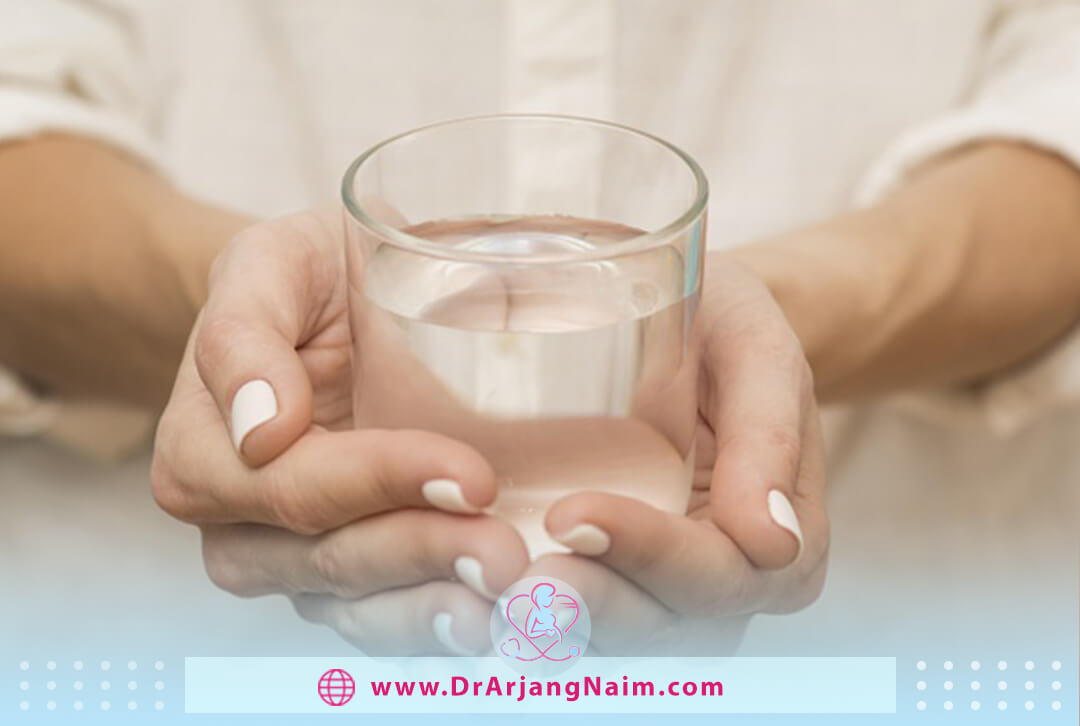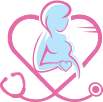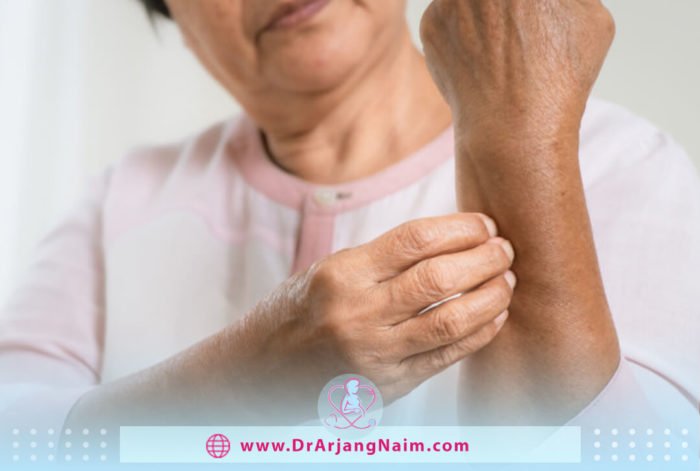Itchy skin is a common problem during menopause. People may experience itching on their bodies, face, or genitals.
Menopause is a natural part of the body process that occurs in most women in the middle third of their age. During this time, the ovaries usually produce less natural sex hormones (estrogen and progesterone). Estrogen promotes the natural growth of the breasts, uterus, ovulation cycle and affects many of a woman’s physical appearance and well-being. Progesterone also controls menstruation and prepares the uterine wall for fertilized eggs. Hormonal changes that occur during menopause can cause many well-known and unpleasant physical symptoms, such as hot flashes, mood swings, vaginal dryness, and night sweats.
Some women may also experience changes in their skin, such as itchy skin. Itching may persist in the Perimenopause period and shortly after menopause. The Perimenopause period is 8 to 10 years before menopause.
Menopause and itchy skin
Menopause can be considered the end of the menstrual period; any woman’s last menstruation can be considered synonymous with the beginning of menopause.
Therefore, at such times, the production of female hormones such as estrogen and progesterone by the ovaries begins to decrease and is reduced to a very small extent leading to menopause. Decreased estrogen production reduces the natural function of collagen in the skin, which causes the skin to lose its natural thickness and become drier.
Estrogen is important for skin health. This hormone helps keep the skin hydrated by stimulating the production of natural oils in the body as well as collagen. Collagen is a protein that provides firmness and elasticity to the skin. Decreased oils and natural collagen can cause the skin to become drier and thinner than before menopause, which can lead to itchy skin.
Types of itching
Menopausal women may experience different types of itching.
Skin itching
Because the skin becomes drier and less flexible during menopause, women may become more sensitive to products such as soaps and detergents that can irritate the skin and cause inflammation and itching. Some women experience numbness of the skin in addition to itching. This condition is known as paresthesia.
Some women experience a rare form of paresthesia called formication during menopause. Formation creates a sensation similar to that of insects crawling under the skin.
The range of itching may vary from mild to severe. In more severe cases, itching may cause significant sleep disturbances as well as changes in normal life. Other skin changes that may accompany itching include:
- Dry skin
- Skin rash
- Reddened skin
- Small bumps on the surface
Genital itching
Decreased estrogen levels can cause vaginal problems during menopause or after menopause. People may notice more vaginal itching during menopause. Vaginal itching is called vulvar itching.
Low levels of estrogen can dry out vaginal tissue and make it thinner than usual. When this happens, it is called vaginal atrophy or atrophic vaginitis, which can cause itching and pain in the vagina or vulva. It may also make sex more painful. The following factors can also cause vaginal itching:
- Irritation from soaps or detergents
- Inflammation
- Vaginal, vulvar, or rarely, cervical cancers
Preventing itchiness during menopause

Women can reduce the risk of itchy skin during menopause by doing the following:
- Stay hydrated: Drinking enough water is essential to maintain healthy skin and prevent dull and itchy skin.
- Avoid hot baths or showers: Using hot baths or showers can cause the skin to lose its essential oils. It is better to use lukewarm water for those with irritated skin.
- Drying after bathing: Rubbing dry skin after bathing or showering can cause more irritation and itching of the skin. Gently touch the skin with a soft, clean towel to prevent further irritation.
- Avoid scratching: Scratching the skin can tear and damage the skin, especially if it is already sensitive or inflamed. Instead, use a cool compress to relieve itching. Wear gloves at night so do not scratch the skin in your sleep.
- Use scent-free skincare: Soaps and scented perfumes contain chemicals that can irritate the skin. Unscented soaps and cleansers are safer for dry and sensitive skin.
- Reduce alcohol and nicotine intake: These substances can cause dry skin, resulting in premature aging of the skin.
- Wear soft, loose fabrics: Cotton and fabric garments are less irritating to the skin than wool or synthetic fibers, which may also stick to the skin.
- Avoid strong sunlight: Harmful UV rays from the sun can cause dry, itchy, or more sensitive skin. Use sunscreen with a high SPF suitable for sensitive skin.
- Nutrition: A balanced diet rich in natural foods is essential for healthy skin. Some supplements have also shown beneficial effects on the skin. Supplements such as vitamin C, gamma-linolenic acid (GLA), collagen peptides, and omega-3 fatty acids.
Medical treatments
In some cases, the itching may continue despite treatment at home. Over-the-counter (OTC) treatments or prescription drugs may be needed.
Steroid creams
Steroid creams are available with or without a prescription. These substances contain at least one percent of hydrocortisone, which, if used directly on the affected areas, can relieve itching and inflammation of the skin. Steroid creams are for short-term use only. Using topical steroids for more than a week can cause side effects such as thinning of the skin, redness, and blistering.
Antihistamines
Although antihistamines are used to treat allergies, there are some types that can relieve menopausal itching. Antihistamines can be used topically as a cream or as a pill.
Anesthetic creams
Topical anesthetic creams, such as benzocaine cream, numb the skin and provide temporary relief from itching. They are for short-term use only and should not be used on damaged skin as they can make any irritation worse.
Hormone replacement therapy (HRT)
Hormone replacement therapy (HRT) is used during menopause to help increase hormone levels, which can help reduce menopausal symptoms, including hot flashes, vaginal dryness, and bone loss. Although menopausal pruritus is not the main reason for using HRT in people, increasing estrogen levels may reduce itching. HRT may be associated with risks and side effects. People who use hormone replacement therapy should be under the supervision of a doctor.
Phytoestrogens
Phytoestrogens are compounds found naturally in plants. Although they are different from estrogen produced by the body, they can bind to estrogen receptors and function similarly. Research into the effects of phytoestrogens in treating menopausal symptoms is still relatively new. However, phytoestrogens may have some of the same benefits as HRT but with fewer side effects.
Home remedies

There are many home remedies that can be used to relieve itchy skin.
Vitamin C
Vitamin C plays an important role in the formation of collagen in the skin. It can help repair skin damage and can also help prevent dryness, thinning, and itching of the skin.
Oatmeal baths
Colloidal oatmeal is oatmeal made from finely chopped oats. This substance can be found in many natural beauty and bath products. Add colloidal oatmeal to a hot tub. Avoid using very hot water, as it dries and irritates your skin more. Soak for at least 10 minutes and dry your skin after bathing. Oatmeal may help relieve itchy skin.
Moisturizer
Keep your skin well hydrated with a good moisturizer. Using moisturizers helps keep water in the outermost layer of the skin, which can help reduce dryness and itching. Aloe vera gel or calamine lotion may also be used to treat skin disorders.
Herbal supplements
Herbal supplements may relieve some of the symptoms of menopause. Some herbal supplements, such as Dong Kuai, act as phytoestrogens in the body, which may help replenish estrogen in the short term. Other herbal supplements, such as maca root, may help the body produce normal hormones. Be sure to consult your doctor before taking supplements, as some herbal supplements may interact with prescribed medications.
Cool compress
Applying a cool, moist compress to the itchy area can help relieve the irritation.
Seeking help

If itchy skin symptoms persist for three days or more, it is best to see a doctor. In this case, your doctor may ask you how long you have had itchy skin and which part of your body has been most affected. Your doctor may perform tests to rule out other serious medical conditions that can cause itching. These tests include the following:
- Blood tests
- Thyroid, liver, and kidney function tests
- Chest X-rays
Other causes for itchy skin
Itchy skin can be caused by factors other than menopause. Some of the major causes of itchy skin are:
- Allergies
- Cold weather
- Insect bites
- Smoking
- Hot showers
- Harsh soaps
- Alcohol or drug use
- Anxiety
Other conditions that can cause itchy skin include:
- Skin cancer: Skin cancers often appear as freckles, moles, and skin rashes. These skin changes are commonly seen in areas of the body that are most exposed to the sun but can grow elsewhere.
- Candida fungal skin infections: Candida skin infections are often found on parts of the body that rub against each other, such as the groin or armpits. Poor hygiene, tight clothing, or sweating can cause the fungus to multiply.
- Eczema: Eczema is a skin condition that can cause itchy, inflamed, scaly skin that can appear on any part of the body.
- Herpes: Herpes can appear on different parts of the body and often appears in the mouth or genitals. Herpes is associated with blisters and itching of the affected area.
- Psoriasis: Psoriasis is a chronic autoimmune disease that can cause skin symptoms that appear anywhere on the body. Symptoms such as patches of scaly skin, small pink spots, pus-filled blisters, and inflamed skin.
The bottom line
When women experience normal menopause, estrogen production is significantly reduced. Although a small amount of this hormone is made by other organs of the body after menopause, it’s very low and is not enough to maintain Perimenopause states. Progesterone production almost stops in postmenopausal women. Dry skin is a phenomenon that most women struggle with at the beginning of menopause. Itching of the skin during this period is very problematic and is often accompanied by redness and a lot of stress.
People can often treat itching with home remedies, OTC medications, and avoiding certain products. The doctor may recommend hormone therapy if the itching is severe and does not improve with home remedies. Dr. Arjang Naim MD specializes in hormone therapy and the reduction of menopausal symptoms.
Additional questions
- Can linea nigra appear in menopause?
A black line refers to a dark vertical line that usually appears on the abdomen during pregnancy. Although associated with pregnancy, some women may experience linea nigra without pregnancy. Environmental factors and some hormonal changes may usually be responsible for black lines in non-pregnant women. Hormonal changes during puberty and menopause may contribute to the darkening of the skin and dark lines.
- What is Paresthesia?
Paresthesia refers to a burning or stinging sensation that is usually felt in the hands, arms, legs, or feet, but can also occur in other parts of the body.
- Which hormone is responsible for itching?
Histamine is an important mediator of peripheral itching. After being released from mast cells activated by irritants and allergens, histamine causes inflammation and itching by stimulating a subset of unmyelinated C fibers.
- What does over-the-counter mean?
Over-the-counter refers to a drug that can be purchased without a prescription. Examples include pain relievers such as aspirin and acetaminophen.
- Can a vitamin deficiency cause itchy skin?
A deficiency of both vitamin B12 and vitamin A can cause itchy skin, so if you suffer from chronic itchy skin, testing your levels of these vitamins can be helpful.
References
https://www.menopausecentre.com.au/itchy-skin/
https://skinkraft.com/blogs/articles/menopause-itching
https://www.medicalnewstoday.com/articles/322587#preventing-itchiness
https://www.webmd.com/beauty/features/menopause-dry-skin-hormone-connection
https://www.healthline.com/health/menopause/menopause-itching#outlook
https://menopause.livebetterwith.com/blogs/stories-info/coping-with-itchy-during-menopause




